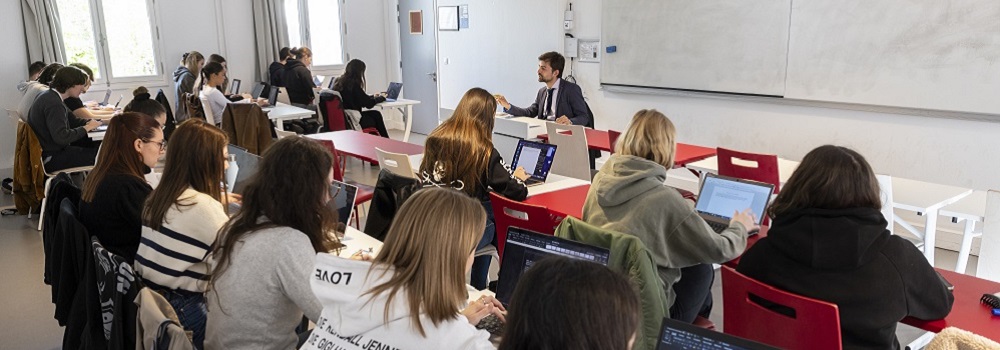Program
Methods of Instruction
This class is a lecture for large groups. Students are invited to listen to the lecture, take notes, ask questions, and develop their knowledge with additional key readings.
Assessment and Final Grade
Students will have to pass a written exam at the end of the semester which constitutes 100% of their grade. More detailed information will be provided during class.
Course Schedule
I. From the Westphalian System to Global Governance
1. Introduction & Overview
Recommended reading
▪ Beth A. Simmons & Lisa L. Martin, “International Organizations and Institutions”, in Walter Carlsneas, Thomas Risse, Beth Simmons, (eds), Handbook of International Relations, Sage, 2001, pp. 192-210.
2. Theoretical approaches to international institutions
Recommended reading
▪ Susan Park, “International Organizations in World Politics”, in John Baylis et al., The Globalization of World Politics : An Introduction to International Relations, 8th edition, Oxford, Oxford University Press, 2020, pp. 319-333.
II. Actors in Global Governance
3. The UN System
Recommended reading
▪ Thomas G. Weiss, “How United Nations Ideas Change History”, Review of International Studies, vol. 36, 2010, pp.3-23.
4. Regional Organizations
Recommended readings
▪ Kelly-Kate S. Pease, “Regional Security, in International Organizations : Perspectives on Global Governance, Sixth edition, New York, Routledge, 2019, pp. 156-172.
5. Non-State Actors
Recommended reading
▪ Thomas G. Weiss, D. Conor Seyle, Kelsey Coolidge, “The Rise of Non-State Actors in Global Governance. Opportunities and Limitations”, One Earth Future Discussion Paper, pp. 1-23, URL: https://oneearthfuture.org/sites/default/files/documents/publications/GGWEISSFinalR6_0.pdf
III. Issues in Global Politics
6. International Security
Recommended reading
▪ Marrack Goulding, “The Evolution of United Nations Peacekeeping”, International Affairs, vol 69, no. 3, 1993, 45-464.
7. International Security & Justice
Recommended reading
▪ Serge Sur, “The Evolving Legal Aspects of War”, in Yves Boyer and Julian Lindley-French, The Oxford Handbook of War, Oxford University Press, pp. 116-131.
8. Human Rights
Recommended readings
▪ David P. Forsythe, “Introduction: Human Rights in International Relations, in: Human Rights in International Relations, 3rd edition, 2012, pp. 3-37.
9. Environment
Recommended reading
▪ Frank Biermann, “Global Environmental Governance”, in: Khi V. Thai, Dianne Rahm, Jerrel D. Coggburn, Handbook of Globalization and the Environment, New York, CRC Press, pp. 137-154.
IV. Global governance and its critics
10. & 11. Conclusion: Legitimacy and efficiency of international institutions
Recommended readings
▪ John Ikenberry, “The Future of the Liberal World Order: Internationalism After America”, Foreign Affairs, vol. 90, no. 3, 2011, pp. 56-62, 63-68.
Bibliography
Recommended handbooks
▪ Baylis, John, Smith, Steve, Owens, Patricia, The Globalization of World Politics. An Introduction to International Relations, Oxford, Oxford University Press, 6th ed., 2013.
▪ Pease, Kelly-Kate S., International Organizations : Perspectives on Global Governance, Sixth edition, New York, Routledge, 2019.
▪ Reinalda Bob et al. Routledge Handbook of International Organization, Milton Park, Abingdon, Oxon, Routledge, 2013.
▪ Devin, Guillaume, Les Organisations Internationales, Paris, Armand Colin, 2016.
▪ Dario Battistella, Franck Petitville, Marie-Claude Smouts, Pascal Venesson, Dictionnaire des relations internationales : approches, concepts, doctrines, Paris, Dalloz, 2012.
▪ Moreau Defarges, Philippe, La gouvernance, 4th ed., Paris, Presses universitaires de France, 2011.
▪ Smouts, Marie-Claude, Les nouvelles relations internationales. Pratiques et théories, Presses de Science Po, 1999.
▪ Dario Battistella, Jérémie Cornut, Elie Baranetz, Théories des Relations Internationales, Paris, Presses de Sciences Po, 6e éd., 2019.
▪ Roche, Jean-Jacques, Relations internationales, Paris, LGDJ, 2014.
General bibliography
▪ Baccini, L., & Koenig-Archibugi, M., “Why do States Commit to International Labor Standards? Interdependent Ratification of Core ILO Conventions, 1948–2009”, World Politics, vol. 66, no. 3,2014, pp. 446-490.
▪ Bajoria, Jayshree, “The Dilemma of Humanitarian Intervention” Council on Foreign Relations, March 2011.
▪ Barnett, Michael and Finnemore, Martha, Rules for the World: International Organizations in Global Politics, Cornell University Press, 2004.
▪ Bellamy Richard, and Palumbo, Antonino, From Government to Governance, Farnham Burlington, Vt, Ashgate. 2010.
▪ Betts, Alexander, “The International Politics of Migration”, St Antony's International Review, vol. 6, no. 2, 2011, pp. 134-150.
▪ Betts, Alexander, (ed), Global Migration Governance, Oxford University, Press, 2011.
▪ Bigo, Didier, and Walker, Rob B. J., “Le régime de contre-terrorisme global”, Au nom du 11 septembre... Les démocraties à l'épreuve de l'antiterrorisme, Paris, La Découverte, 2008, pp. 11-35.
▪ Buzan, Barry and Lawson, George, The Global Transformation, History, Modernity and the Making of International Relations, Cambridge, Cambridge University Press, 2015.
▪ Chayes, Abram and Handler Chayes, Antonia, “On Compliance”, International Organization, vol. 47, no. 2, pp. 175-205.
▪ Checkel, Jeffrey T., “The Constructivist Turn in International Relations Theory”, World Politics, vol. 50, no. 2, pp. 324-348.
▪ Clavin, Patricia, “Defining Transnationalism”, Contemporary European History, vol. 14, no. 4, 2005, pp. 421-439
▪ Dahl, Robert, “Can International organization be democratic? A skeptic view,” in Ian Shapiro and Casiano Hacker-Cordón, (eds), Democracy’s Edges, Cambridge University Press, 1999.
▪ Dahl, R. 1999. “Can international organizations be democratic? A skeptic’s view”, in I. Shapiro and C. Hacker-Cordón, (eds), Democracy’s Edges, Cambridge, Cambridge University Press, pp. 19-36.
▪ Diehl, Paul, The Politics of Global Governance: International Organizations in an Interdependent World, Lynn Rienner, 2001.
▪ Duffield, John S., “International Regimes and Alliance Behavior: Explaining NATO Conventional Force Levels”, International Organization, vol. 46, no. 4, pp. 819-855.
▪ Falk, Richard and Andrew Strauss, “Toward Global Parliament,” Foreign Affairs, vol. 80, no. 1, 2004, pp. 212-220.
▪ Fehl, C., “Explaining the International Criminal Court: A 'Practice Test' for Rationalist and Constructivist Approaches”, European Journal of International Relations, vol. 10, no. 3, 2004, pp. 357-94.
▪ Florini, Ann M., “Who does what? Collective action and the changing nature of authority,” in Richard Higgot, Geoffrey R. D. Underhill, and Andreas Bieler (eds), Non-State Actors and Authority in the Global System, Routledge, 2000, pp.15-29.
▪ Frederking, Brian and Paul F. Diehl, eds., The Politics of Global Governance: International Organizations in an Interdependent World, 5th ed., Lynne Rienner, 2015.
▪ Freedman, Martin and Bikki Jaggi, “Global Warming Disclosures: Impact of Kyoto Protocol Across Countries”, Journal of International Financial Management & Accounting, vol. 22, no. 1, pp. 46–90.
▪ Gartzke, Erik and Megumi Naoi‚ “Multilateralism and Democracy: A Dissent Regarding Keohane, Macedo, and Moravcsik”, International Organization, vol. 65, no. 3, 2011, pp. 589-598.
▪ Gruber, Lloyd, Ruling the World: Power Politics and the Rise of Supranational Institutions, Princeton, Princeton University Press, 2000.
▪ Hafner-Burton, Emilie and Tsutsui, Kiyo. “Justice Lost! The Failure of International Human Rights Law to Matter Where Needed Most”, Journal of Peace Research, vol. 44, no. 4, 2007, pp. 407-425.
▪ Harris, Paul G., Routledge Handbook of Global Environmental Politics, London, New York, Routledge, 2014.
▪ Hemmer, Christopher and Katzenstein, Peter J., “Why is there no NATO in Asia? Collective Identity, Regionalism, and the Origins of Multilateralism”, International Organization, vol. 56, no. 3, 2003, pp. 575-607.
▪ Hurd, Ian, International Organizations: Politics, Law, Practice, second edition, Cambridge: Cambridge University Press, 2014.
▪ Hurd, Ian, “Legitimacy and Authority in International Politics,” International Organization, vol. 53, no. 2, 1999, pp. 379-408.
▪ Ikenberry, John, “Why the Liberal World Order Will Survive,” Ethics & International Affairs, vol. 32, no. 1, 2018, pp. 17-29.
▪ Ikenberry, John, After Victory. Institutions, Strategic Restraint, and the Rebuilding of Order After Major Wars, Princeton, Princeton University Press, 2001.
▪ Karns, Margaret P., Mingst, Karen A., and Stiles, Kendall W., International Organizations: The Politics and Processes of Global Governance, 3rd ed., Lynne Rienner, 2015.
▪ Keck, Margaret and Sikkink, Kathryn, Activists Beyond Borders: Advocacy Networks in International Politics, Cornell University Press. 1998.
▪ Keck, Margaret and Sikkink, Kathryn. “Transnational Advocacy Networks in International and Regional Politics”, International Social Science Journal, vol. 68, no. 227-8, 2018, pp. 65-76.
▪ Keohane, Robert O. and Nye, Joseph S., Power and Interdependence, 4th ed., Longman, 2012.
▪ Krasner, Stephen D., “Regimes and the Limits of Realism: Regimes as Autonomous Variables”, International Organization, vol. 36, no. 2, pp. 497-510.
▪ Lamy, Steven L., Baylis, John, Smith, Steve, Owens, Patricia, Introduction to Global Politics, 3e éd., New York, Oxford, Oxford University Press, 2014.
▪ LeRoy Bennett, A., Oliver, James K., International Organizations, Principles and Issues,7th ed., Prentice Hall, 2002.
▪ Loescher, G., “The UNHCR and World Politics: State Interests vs. Institutional Autonomy”, International Migration Review, vol. 35, no. 1, 2001, pp. 33-56.
▪ Martin, Lisa L. and Simmons, Beth A., “Theories and Empirical Studies of International Institutions,” International Organization, vol. 52, no. 4, 1998, pp. 729-757.
▪ Mearsheimer, John J., “Bound to Fail: The Rise and Fall of the Liberal International Order,” International Security, vol 43, no.4, 2019, pp. 7-50.
▪ Mearsheimer, John, “The False Promise of International Institutions”, International Security, vol. 19, no. 3, 1994-5, pp. 5-49.
▪ Moravcsik, Andrew‚ “The Origins of Human Rights Regimes: Democratic Delegation in Postwar Europe”, International Organization, vol. 54, no. 2, 2000, pp. 217-252.
▪ Ohmae, Kenichi, “The Rise of Region State,” Foreign Affairs, vol. 72, no. 2, 1992-3, pp. 78-81.
▪ Moreau Defarges, Philippe, La gouvernance, 4th ed., Paris, Presses universitaires de France, 2011.
▪ Morin, Jean-Frédéric, Ordini, Amandine, Essential Concepts of Global Environmental Governance, 2nd ed., Abingdon, Oxon, New York, Routledge, 2020.
▪ Olson, Mancur, The Logic of Collective Action: Public Goods and The Theory of Groups, Harvard University Press, 1965.
▪ Peinhardt, Clint, Sandler, Todd, Transnational Cooperation: An Issue-Based Approach, New York, Oxford University Press, 2015.
▪ Pouligny, Béatrice. « Une société civile internationale ? », Critique internationale, vol. 13, no. 4, 2001, pp. 120-122.
▪ Price, Richard, “Reversing the Gun Sights: Transnational Civil Society Targets Land Mines”, International Organization, vol. 52, no. 3, 1998, pp. 613-644.
▪ Ramel, Frédéric, Balzacq, Thierry (dir.), Traité de relations internationales, Paris, Presses de Sciences Po, 2013.
▪ Rittberger, V., Bernard Zangl and Andreas Kruck, International Organization, 2nd ed., Basingstoke, Palgrave, 2012.
▪ Rochester, Martin J. “The Rise and Fall of International Organization as a Field of Study”, International Organization, vol, 40, no. 4, 1986, pp. 777-813, 1986.
▪ Shapiro, Ian and Hacker-Cordón, Casiano, (eds), Democracy’s Edges, Cambridge University Press, 1999.
▪ Simmons, Beth, Mobilizing for Human Rights: International Law in Domestic Politics, Cambridge, Cambridge University Press, 2009.
▪ Slaughter, Anne Marie, A New World Order, Princeton, Princeton University Press, 2004.
▪ Solingen, Etel‚ “The Genesis, Design and Effects of Regional Institutions: Lessons from East Asia and the Middle East”, International Studies Quarterly, vol. 52, no. 2, 2008, pp. 261-294.
▪ Spruyt, Hendrik, The Sovereign State and Its Competitors, Princeton, Princeton University Press, 1996.
▪ Tobin, James, “A comment on Dahl’s skepticism”, in Ian Shapiro and Casiano Hacker-Cordón, (eds), Democracy’s Edges, Cambridge University Press, 1999.
▪ Underdal, Arild, “The Concept of Regime ‘Effectiveness’”, Cooperation and Conflict, vol. 27, no. 3, 1992, pp. 227-240.
▪ Underhill, Geoffrey R. D., and Andreas Bieler, (eds), Non-State Actors and Authority in the Global System, Routledge, 2000.
▪ Weiss, Thomas G., Forsythe, David P., Coate, Roger A., and Pease, Kelly-Kate, The United Nations and Changing World Politics, 8th ed., Westview, 2020.
▪ Yanacopulos, Helen, “The strategies that bind: NGO coalitions and their influence,” Global Networks, vol. 5, no. 1, 2005, pp. 93–110.
▪ Zweifel, Thomas D., International Organizations and Democracy: Accountability, Politics, and Power, Lynn Rienner, 2006.


 Libraries
Libraries
 Practical information
Practical information
